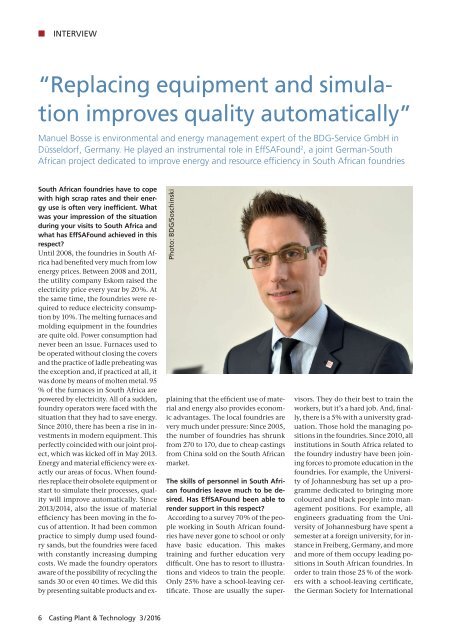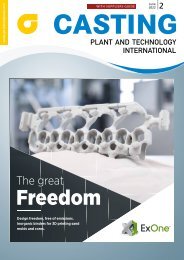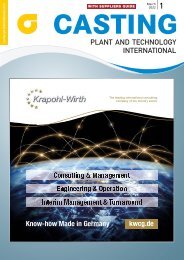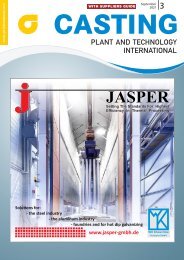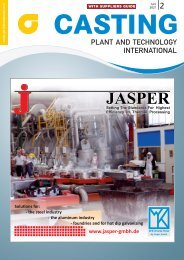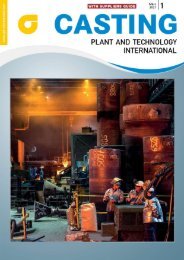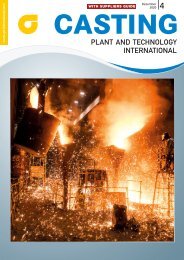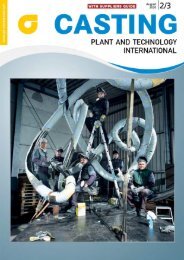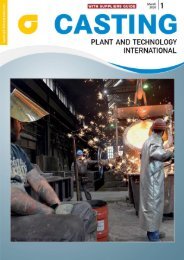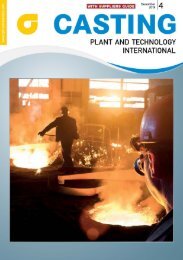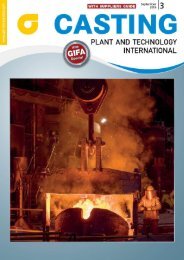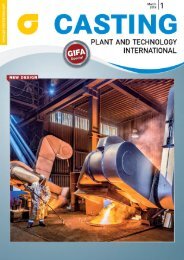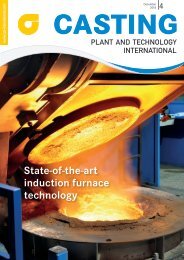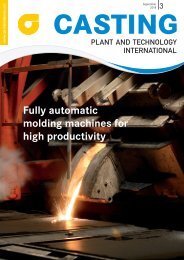CPT International 03/2016
The leading technical journal for the global foundry industry – Das führende Fachmagazin für die weltweite Gießerei-Industrie
The leading technical journal for the
global foundry industry – Das führende Fachmagazin für die
weltweite Gießerei-Industrie
You also want an ePaper? Increase the reach of your titles
YUMPU automatically turns print PDFs into web optimized ePapers that Google loves.
K INTERVIEW<br />
“Replacing equipment and simulation<br />
improves quality automatically”<br />
Manuel Bosse is environmental and energy management expert of the BDG-Service GmbH in<br />
Düsseldorf, Germany. He played an instrumental role in EffSAFound 2 , a joint German-South<br />
African project dedicated to improve energy and resource efficiency in South African foundries<br />
Photo: BDG/Soschinski<br />
South African foundries have to cope<br />
with high scrap rates and their energy<br />
use is often very inefficient. What<br />
was your impression of the situation<br />
during your visits to South Africa and<br />
what has EffSAFound achieved in this<br />
respect?<br />
Until 2008, the foundries in South Africa<br />
had benefited very much from low<br />
energy prices. Between 2008 and 2011,<br />
the utility company Eskom raised the<br />
electricity price every year by 20 %. At<br />
the same time, the foundries were required<br />
to reduce electricity consumption<br />
by 10 %. The melting furnaces and<br />
molding equipment in the foundries<br />
are quite old. Power consumption had<br />
never been an issue. Furnaces used to<br />
be operated without closing the covers<br />
and the practice of ladle preheating was<br />
the exception and, if practiced at all, it<br />
was done by means of molten metal. 95<br />
% of the furnaces in South Africa are<br />
powered by electricity. All of a sudden,<br />
foundry operators were faced with the<br />
situation that they had to save energy.<br />
Since 2010, there has been a rise in investments<br />
in modern equipment. This<br />
perfectly coincided with our joint project,<br />
which was kicked off in May 2013.<br />
Energy and material efficiency were exactly<br />
our areas of focus. When foundries<br />
replace their obsolete equipment or<br />
start to simulate their processes, quality<br />
will improve automatically. Since<br />
2013/2014, also the issue of material<br />
efficiency has been moving in the focus<br />
of attention. It had been common<br />
practice to simply dump used foundry<br />
sands, but the foundries were faced<br />
with constantly increasing dumping<br />
costs. We made the foundry operators<br />
aware of the possibility of recycling the<br />
sands 30 or even 40 times. We did this<br />
by presenting suitable products and explaining<br />
that the efficient use of material<br />
and energy also provides economic<br />
advantages. The local foundries are<br />
very much under pressure: Since 2005,<br />
the number of foundries has shrunk<br />
from 270 to 170, due to cheap castings<br />
from China sold on the South African<br />
market.<br />
The skills of personnel in South African<br />
foundries leave much to be desired.<br />
Has EffSAFound been able to<br />
render support in this respect?<br />
According to a survey 70 % of the people<br />
working in South African foundries<br />
have never gone to school or only<br />
have basic education. This makes<br />
training and further education very<br />
difficult. One has to resort to illustrations<br />
and videos to train the people.<br />
Only 25% have a school-leaving certificate.<br />
Those are usually the supervisors.<br />
They do their best to train the<br />
workers, but it’s a hard job. And, finally,<br />
there is a 5% with a university graduation.<br />
Those hold the managing positions<br />
in the foundries. Since 2010, all<br />
institutions in South Africa related to<br />
the foundry industry have been joining<br />
forces to promote education in the<br />
foundries. For example, the University<br />
of Johannesburg has set up a programme<br />
dedicated to bringing more<br />
coloured and black people into management<br />
positions. For example, all<br />
engineers graduating from the University<br />
of Johannesburg have spent a<br />
semester at a foreign university, for instance<br />
in Freiberg, Germany, and more<br />
and more of them occupy leading positions<br />
in South African foundries. In<br />
order to train those 25 % of the workers<br />
with a school-leaving certificate,<br />
the German Society for <strong>International</strong><br />
6 Casting Plant & Technology 3 /<strong>2016</strong>


